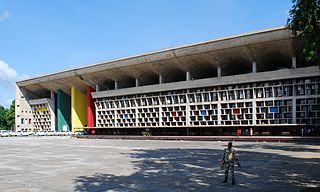Related Research Articles

The High Court of Bombay is the high court of the states of Maharashtra and Goa in India, and the union territory of Dadra and Nagar Haveli and Daman and Diu. It is seated primarily at Mumbai, and is one of the oldest high courts in India. The High Court has circuit benches at Nagpur and Aurangabad in Maharashtra and Panaji, the capital of Goa.
The High Court of Delhi was established on 31 October 1966, through the Delhi High Court Act, 1966, with four judges, Chief Justice K.S. Hegde, Justice I. D. Dua, Justice H.R. Khanna and Justice S.K. Kapur. The High Court of Delhi is the Highest Court performing Judicial Functions in the NCT of Delhi at the State level. Below it are the Subordinate Courts, functioning for 9 Judicial Districts namely (1) Central (2) New Delhi (3) South (4) South-West (5) North (6) North-West (7) West (8) North-East (9) East. The High Court of Delhi is the highest judicial organ in a State. It gets its powers from Chapter V in Part VI of the Constitution of India.
A Sessions Court or even known as the Court of Sessions Judge is a court of law which exists in several Commonwealth countries. A Court of Session is the highest criminal court in a district and the court of first instance for trying serious offences, i.e., those carrying punishment of imprisonment of more than seven years, life imprisonment, or death.

Sivasagar is a town and headquarter of the Sivasagar district, Assam. Sivasagar is situated about 360 kilometers (224 mi) northeast of Guwahati. It is well known for its Ahom palaces and monuments. Sivasagar is an important centre for tea and oil industries today.

Punjab and Haryana High Court is the common High Court for the Indian states of Punjab and Haryana and the Union Territory of Chandigarh based in Chandigarh, India. Sanctioned strength of Judges of this High Court is 85 consisting of 64 Permanent Judges and 21 Additional Judges including Chief Justice. As of 14 September 2023, there are 58 Judges working in the High Court, comprising 36 Permanent and 22 Additional Judges.
The high courts of India are the highest courts of appellate jurisdiction in each state and union territory of India. However, a high court exercises its original civil and criminal jurisdiction only if the subordinate courts are not authorized by law to try such matters for lack of peculiary, territorial jurisdiction. High courts may also enjoy original jurisdiction in certain matters, if so designated specially by the constitution, a state or union law.

The High Court of Kerala is the highest court in the Indian state of Kerala and the Union territory of Lakshadweep. It is located in Kochi. Drawing its powers under Article 226 of the Constitution of India, the High Court has the power to issue directions, orders and writs including the writs of habeas corpus, mandamus, prohibition, quo warranto and certiorari for ensuring the enforcement of the Fundamental Rights guaranteed by the Constitution to citizens or for other specified purposes. The High Court is empowered with original, appellate and revisional jurisdiction in civil as well as criminal matters, and the power to answer references to it under some statutes. The High Court has the superintendence and visitorial jurisdiction over all courts and tribunals of inferior jurisdiction covered under its territorial jurisdiction.
The district courts of India are the district courts of the state governments in India for every district or for one or more districts together taking into account of the number of cases, population distribution in the district. They administer justice in India at a district level.

Jodhpur District is a district in the State of Rajasthan in western India. The city of Jodhpur is the administrative headquarters of the district.

Rao Bahadur and Rai Bahadur, abbreviatedR.B., was a title of honour bestowed during British rule in India to individuals for outstanding service or acts of public welfare to the Empire. From 1911, the title was accompanied by a medal called a Title Badge. Translated, Rao means "King", and Bahadur means "Brave". Bestowed mainly on Hindus, the equivalent title for Muslim and Parsi subjects was Khan Bahadur. For Sikhs it was Sardar Bahadur.

The judiciary of India is a system of courts that interpret and apply the law in the Republic of India. India uses a common law system, first introduced by the British East India Company and with influence from other colonial powers and Indian princely states, as well as practices from ancient and medieval times. The Constitution of India provides concept for a single and unified judiciary in India.

The State Courts of Singapore is one of the three categories of courts in Singapore, the other categories being the Supreme Court and Family Justice Courts. The State Courts comprise the District and Magistrate Courts—both of which oversee civil and criminal matters—as well as specialised courts such as the coroner's courts and the Small Claims Tribunals.
The Government of Uttar Pradesh is the subnational government of the Indian state of Uttar Pradesh with the governor as its appointed constitutional head of the state by the President of India. The Governor of Uttar Pradesh is appointed for a period of five years and appoints the Chief Minister of Uttar Pradesh and their council of ministers, who are vested with the executive powers of the state. The governor remains a ceremonial head of the state, while the chief minister and their council are responsible for day-to-day government functions.

The Government of Bihar or Bihar Government is the state government of the Indian state of Bihar and its 9 divisions which consist of 38 districts. It consists of an executive, led by the Governor of Bihar, a judiciary and legislative branches.
Principal secretary is a post in state governments and the central government of India. The position holder is generally a senior Indian Administrative Service officer or other senior civil servants. Principal secretaries generally are the administrative heads of departments in a state government. They can also be deputed to central government in the post of a Joint secretary.

Khasi Hills Autonomous District Council (KHADC) is an autonomous district council in the state of Meghalaya in India. It covers West Khasi Hills district, Eastern West Khasi Hills district, East Khasi Hills district and Ri Bhoi district. It is one of the three autonomous district councils within Meghalaya, and one of twenty-five autonomous regions of India. Between its foundation on 27 June 1952 and 14 June 1973 it was known as the United Khasi-Jaintia Hills District Council. The total area of the Khasi Hills Autonomous District Council is 11,718 km2 having a population of 1,578,375 as of 2011.

Jaintia Hills Autonomous District Council (JHADC) is an autonomous district council in the state of Meghalaya in India. It is one of the three autonomous district councils within Meghalaya, and one of twenty-five autonomous regions of India. Present Jaintia hills was a part of historical Jaintia Kingdom. It was formed as the Jowai Autonomous District Council on 23 November 1964 from the Jowai Subdivision of the United Khasi-Jaintia Hills District – adopting its current name on 14 June 1973.
Bihar is a state situated in Eastern India. It is surrounded by West Bengal to the east, Uttar Pradesh to the west, Jharkhand to the south and Nepal to the north.
Karunakaran Babu is an Indian judge who is presently serving as a judge of Kerala High Court. The High Court of Kerala is the highest court in the Indian state of Kerala and in the Union Territory of Lakshadweep. The High Court of Kerala is headquartered at Ernakulam, Kochi. He was serving as the Principal District and Sessions Judge, Thiruvananthapuram before being elevated as the judge of Kerala High Court.
References
- ↑ "Appointment of Subordinate Judges". India Code. Retrieved 19 February 2024.